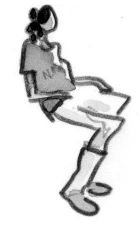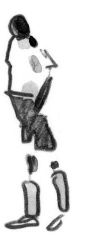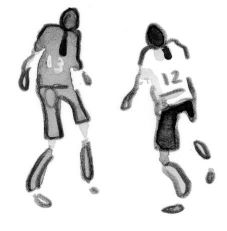Ridiculous/Hilarious/Terrible/Cool (26 page)
Read Ridiculous/Hilarious/Terrible/Cool Online
Authors: Elisha Cooper

BOOK: Ridiculous/Hilarious/Terrible/Cool
10.07Mb size Format: txt, pdf, ePub
“He's going to want to have his friends over.”
She starts building the grass into a neat pile.
“He might change.”
She adds more grass.
“He might not be able to come to my graduation. He's going to be wearing an ankle brace.”
She knocks the pile down. Diana's sisters are still working at the car wash. They complain that they're overweight, but washing cars is the only exercise they get. They say they're going back to school in the fall, but don't know where. Diana will be in Urbana-Champaign, at the University of Illinois. She'll concentrate then. Right now, she wants to have fun.
She has been hanging out more and more with her lifeguard coworkers. They're in their early twenties. She's been going with them to parties and bars. They all watched the recent Oscar de la Hoya boxing match together. Maybe Diana will go to prom with one of them.
The brown line train rumbles by on its tracks.
“I always have to be choosing between friends.”
She rips up another handful of grass.
“I want to be by myself.”
She throws the grass in the air.
“It's going to be good for me to get away.”
Last week, there was a huge march downtown for immigrant rights. Hundreds of thousands of immigrants and their supporters waving banners and flags, marching through the Hay-market and unfurling over the bridges and into the canyons of the Loop, shutting down the city. Diana skipped school to march. But she couldn't persuade her sisters to go. She couldn't persuade her mother. Her father had to work. So, in the end, Diana didn't march, even though she wanted to. She just didn't want to do it by herself.
A pack of kids sit on the benches behind Truman rolling blunts. One of them is Zef. He's not partaking, though. Ten minutes later, at the Starbucks across the street, he's sipping his Americano and laughing, because just as he was leaving, the kids got busted by a teacher.
“I
told
them!” he chuckles.
told
them!” he chuckles.
Zef is smiling but seems out of sorts. There's a girl he likes who doesn't like him back. As he leans in his tight-fitting gray jacket into the Starbucks wall, he starts twirling the white wires of his iPod earphones around his head like a lasso.
“I met this girl named Daisy, and then she just dropped off the edge of the planet. Really skinny, really short. Reddish-brown hair. Good-looking?
Hell,
yeah.”
Hell,
yeah.”
Zef's earphone wires start twirling faster.
“Everybody calls her Daisy. She wants people to call her Daisy Mae, but they don't,” he says, adding, “Her favorite flowers are yellow roses.”
Zef hung out with Daisy the last few days, but he doesn't know where she is anymore. He never bothered to get her number. When he mentions this, his earphone wires stop rotating and plonk down onto the table.
“I have a really hard time meeting girls,” he admits.
With his lazy good looks, girls usually approach Zef. But what to do if they don't approach is a question he doesn't know how to answer.
“I don't really do anything to meet people,” he acknowledges with a shrug. As the Americano kicks in, Zef's mood improves. Also, he's flush with money. He flashes the fifty-Euro note some guy gave him for directing another guy to a third guy who sells 'shrooms. It was good money, but there was a catch. There's always a catch.
“
Currency
exchanges no longer exchange
currency!
” Zef exclaims, laughing at the absurdity of it all. Zef has been making money other ways, though. With his iPod fixed, he's renting out the iPod Nano he was given by his grandmother. He was also given five hundred dollars by relatives for his birthday. And though he lost his wallet a few days after that (he thinks it fell out of his pocket when he was climbing a tree), the five hundred dollars was not inside.
Currency
exchanges no longer exchange
currency!
” Zef exclaims, laughing at the absurdity of it all. Zef has been making money other ways, though. With his iPod fixed, he's renting out the iPod Nano he was given by his grandmother. He was also given five hundred dollars by relatives for his birthday. And though he lost his wallet a few days after that (he thinks it fell out of his pocket when he was climbing a tree), the five hundred dollars was not inside.
Last week he turned seventeen. Zef celebrated by not going to school. Instead, he went to Payton.
It wasn't because of any affection. “That motto they have? âWe breed leaders,' something like that. But, the drugs! That school is
ridiculous,
” he says, nodding. “It's gone downhill since I left.”
ridiculous,
” he says, nodding. “It's gone downhill since I left.”
Zef met up with his friends at the Payton front door since he is not allowed inside. They went to one of their houses and hung out and then went to Zef's house and hung out. He's been hanging out a lot this month. Last weekend he went to his first rave. He rode in the back of a friend's red convertible, wind whipping through his hair, cruising south on the interstate. The rave was in a bowling alley.
“Too hot in the basement. Everyone dancing. No fan, got real unpleasant. It was a good time.”
Zef starts twirling his earphone lasso again. He has plans for summer.
“Get speakers for the car, get my license.”
“Go to the beach!” pipes in Zef's friend, the same friend who joined Zef last time, Silent Bob's not-so-silent brother.
“I don't like the beach. I like pools,” Zef states, putting an end to that.
Silent Bob's brother takes off someplace. Zef frowns, his mood hopping from glum to animated to glum in a venti-induced heartbeat. Zef hasn't been making much music recently.
“It's kind of like writer's block, but, like, for music.”
He hasn't been inspired. He's getting forgetful. Today he forgot to bring his cell phone to school.
“I feel weird without my phone. I feel quite naked,” Zef says, patting the empty spot on his belt where the phone usually hangs out. Its absence seems to distract him. He picks up his earphones, twirls them, lets them fall.
“I want a girlfriend,” he says. Then he's quiet for a long time.
“I
do
things, know what I'm saying? I should be a lot happier than I am.”
do
things, know what I'm saying? I should be a lot happier than I am.”
Zef reconsiders, picks up his earphones and starts twirling again.
“Things are good. I am.
Yeah
.”
Yeah
.”
Zef takes a last pull on his coffee, then heads outside. He's still talking, ricocheting from girls to music to sleep to girls. Life can be exhilarating and baffling, often in the exact same moment.
A bus rumbles past: Zef's bus. Off he runs, arms waving like an ostrich trying to gain flight, trying to flag down the bus before it leaves him by the side of the road.
Aisha thinks back to the beginning of the school year when she had no friends. She feels she's made friends since thenâthe girls from her art class who let her into their group. They're not best friends or anything, but friends. Last weekend they all went out to dinner and then to a chick-flick.
She likes these girls, though she wonders if she'll remember them a few years from now. This was just a year, it was always that. Sometimes she feels bad that she didn't have a classic high school experience, and then she doesn't. She's always been able to pick up and go.

Aisha is sitting in her art teacher's office, wearing a T-shirt with SPEEDWEEK DAYTONA BEACH in garish letters across the front. Her Florida grandmother loves “the NASCAR.”
Aisha had her final Arabic class. The class divided into groups and wrote a scene where a girl meets her suitor's family.
“I played the young girl who was getting proposed to,” Aisha says, chuckling.
Daniel Patton, in a suit, pokes his head into the art office, waves, pokes his head out. Aisha raises her eyebrows, amused by this awkward and well-dressed interruption.
The cast was made up of Aisha, a girl from Yemen, and two Spanish “kids.” One of the “kids” is a Spanish professor at Loyola University. He kept screwing up his lines.
“He'd jump in two pages after he was supposed to and say âYour mother is from Jordan!' And we're like, âThat's not your cue!'”
Aisha wipes her eyes, she's laughing so hard. Her art teacher pops her head in. She needs the office.
Aisha heads into the halls, walking past the lockers and the trophy cases, looking for the sets she helped paint for the spring play. She drops her pencil. As she bends to pick it up, she starts talking about her family. Her father got a new engineering job in Austin, Texas. The Shaikhs will relocate again, though her sisters will stay in Chicago to finish their next year of school. Aisha wishes the family would buy a house in Chicago and move the family's possessions up from Florida. They need space to keep all the things they've accumulated from their travels around the world.
“And I'm not just talking a stool. Antique stuff from China. All teak and heavy,” Aisha says, furrowing her brow. “What are we going to do with it?”
She stops. A physics class is running an experiment in the hallway in front of her, two wheeled metal cars bouncing headlong into each other before bouncing back.
Aisha wonders what she would put in the
Important Box
now, what she would take with her next year to college. But there's no answer really, no
thing
that she would miss. Some things can't be packed neatly in a box. Every now and then, on the weekend, Aisha smokes a
shisha
water pipe with her father. She will miss that.
Important Box
now, what she would take with her next year to college. But there's no answer really, no
thing
that she would miss. Some things can't be packed neatly in a box. Every now and then, on the weekend, Aisha smokes a
shisha
water pipe with her father. She will miss that.
It's the state quarterfinals, Payton girls' soccer against Lane Tech, the same team they lost to in the city semifinals. All eyes in Lane Tech's stadium are on Lane's number 13, the blade of grass with the bold moves who single-handedly beat Payton last time. When she has the ball, fans in the Payton stands yell, “She's
too dangerous!
”
too dangerous!
”
Number 13 has almost 40 goals this year, 150 over her career. That's why, today, the only thing that Emily is doing is marking her. Wherever number 13 goes, Emily goes. One foot behind her. One hand on her jersey, sacrificing her position as the best player on her team to stop the best player on the other team (and sacrificing any chance for Payton to score).

Even with Emily's attention, there are times when number 13 gets the ball, with Emily draped over her, and turns and rips a shot that skims over the crossbar. Emily is playing someone better than she.
At the end of regulation, the game is tied. The first overtime brings nothing. The second overtime brings more nothing.
The game comes down to penalty kicks. If Payton loses, their season is over. Emily crouches off to the side, watching what could be the last moment of her high school soccer career.

The teams start shooting and Emily chews her nails. She throws her arm around her sister, who crouches beside her with her jersey pulled over her face because she can't look. As the shoot-out continues it becomes clear that Emily will not shoot. Her freshmen will. When one misses, Emily shuffles over and hugs her. And when one makes the shot that wins the game, Emily leads the rest of her team in a mad sprint across the field to lift her into the air.
Anais Blake doesn't really have to be at school anymore, but she has an errand she needs to take care of. She glides through the front door wearing a flippy skirt, sunglasses, and small sandals with flowers across the straps.
Other books
The Gallant Guardian by Evelyn Richardson
Frozen by Jay Bonansinga
Sinfully Sexy by Linda Francis Lee
The Burning Point by Mary Jo Putney
Master Red by Natalie Dae
Think About Love by Vanessa Grant
Garden of Dreams by Melissa Siebert
In My Stepbrother's Hands by Tara Lynn
A Different Side (University Park #4) by C.M. Doporto
Touch of a Thief by Mia Marlowe